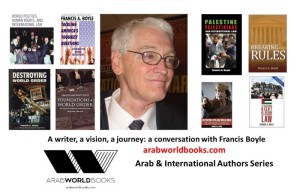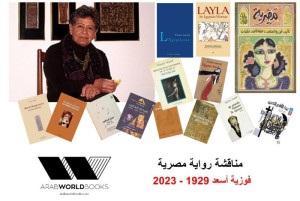I am a citizen of what you now call the Greater Middle East, and you are the leaders of countries that confer under various appellations -- the G8, NATO, the EU, etc. You are the leaders of the Greater Western World, even though you allowed a Muslim country, Turkey, which will host the coming NATO summit in June, to join your ranks.
You are now busy debating reform in the countries of the Greater Middle East. You are preoccupied with reform in our countries because you have reached the conclusion that the absence of reform poses a threat to your own security through the anger and frustration it causes and the terror it spawns. You're of the opinion that we should reform our affairs on all levels, political, cultural, social and economic. This is the main theme of all the initiatives that keep coming our way, the initiatives you are expected to consolidate in a unified and final form in your meetings in June, one addressing all countries of the Greater Middle East, from Morocco to Pakistan; that is, most Muslim countries.
Ahead of your June meetings, I would like to present you with a local vision, with a personal view that is perhaps shared by others in the Greater Middle East.
We do not deny that our affairs need reforming, perhaps badly. As members of civil society in Egypt, we have been preoccupied with reform, calling for it, insisting upon it, and working on it long before you even recognised the need. We want this reform because it is good for us, not because outsiders demand it.
We want to live in societies that have freedom and democracy. We want governments elected by the nation, for the nation is the source of all power. We know that the key to reform is the democratic process, which -- by the way -- did not seem to interest you much in the past.
We have been struggling for freedom, and angered by attacks on this freedom, whether these attacks issue from abroad or from within our midst. We have made some progress, but still have a long way to go. And we want to continue down this path without foreign intervention.
Domestic reform, it has to be said, is not the only source -- not even the main source -- of tribulations in the Greater Middle East, of the tragedies that affect us as well as you.
The crises in the Greater Middle East are not due to the absence of domestic reform alone. More so, they stem from the absence of peace and security and from the overwhelming feeling among the nations of the East that you in the West, directly or indirectly, are responsible for the unjust conditions in the region, that you pay no attention to the suffering of the people of this region -- the people who have been assaulted and whose land and sanctities have been violated in a manner unprecedented in recent history. The assaults on the people of this region are being carried out with your full knowledge, without you doing anything to abate them. You often do little more than propose initiatives, ones you fail to implement, soon abandoning them.
The nations of this Greater Middle East belong to the culture of Islam, a culture that envelops, by the way, non- Muslims as well as Muslims living in the region. These nations have a heightened sense of injustice and frustration with regard to your policies, your double standards and your abandonment of your duties as members of the international community, and as major powers that have been involved in this region for a century or more.
You ignore what is happening in this region, the occupation of land, the usurpation of rights, the violation of human dignity. You see all that and do nothing. You are silent on acts of repression and brutality conducted by the Israeli occupation against the Palestinian people. Even when you denounce the wall of racial segregation erected by the Israeli state on Palestinian land, you still do nothing to stop it. We are particularly puzzled by your refusal to have the issue referred to the International Court of Justice, so that the latter may provide a legal opinion on this serious matter, on a grave violation of international law, on a wall that brings back to memory bitter experiences in your modern history.
You speak of human rights but you do nothing about Israel's assault on Palestinian human rights, on the collective destruction of entire neighbourhoods and commercial districts, on the hundreds of families rendered homeless and jobless. Are you aware of the effect of such actions on the Palestinian people? Are you aware of the despair and the sense of injustice that drives the Palestinians into committing desperate acts? We do not hesitate to condemn such acts, when the victims are civilians, but we understand their cause. You, meanwhile, are silent about the terror that the occupation inflicts on the Palestinians. You do nothing to end the occupation. You do nothing about the settlements that have carved off the land and rights of a nation now forced to live on less than one-fourth of the territory that it once had, a nation that has agreed to have a state on a mere 22 per cent of its historic land, but even that sliver of land is now subject to systematic erosion. Israel is trying to break it apart, dismember it, and turn it into cantons and ghettos. All this is happening, leaders of the Greater Western World, while you watch and do nothing.
You speak of the dangers of mass destruction weapons in the Middle East, and we fully agree. We want the entire region and the world freed from the peril of such weapons. But we resent the double standard; for you want Israel to retain such weapons while other countries in the region disarm. You paid little attention to the Egyptian president's initiative to free the entire region from WMDs. This initiative once had your support and was approved by the UN Security Council following the 1990-1 Gulf War, but nothing was done to implement it. Indeed, some of your officials justify Israel's nuclear stockpiling by claiming that Arab countries want to destroy Israel. How about that Arab summit, held not so long ago, that has offered full peace with Israel in return to the latter's withdrawal of occupied Arab land?
As one who lives in this Greater Middle East, I welcome your interest in the region's affairs. Apparently, you can sense the perils that may come your way if the situation remains unchanged. Yet, you want to place the blame at our doorstep and forget your own responsibility. You act as if it is only us who need to change. But if you really want to address the pain and anger in the region, you should start considering more than domestic reforms. You should begin addressing the main cause of frustration and anger. You have to deal with two major issues: peace and security.
You are proud of the Helsinki effort that has led to a system of security and cooperation in Europe. This particular effort was based more on security than on domestic reform. The starting point was to call on East European countries to recognise post-war borders. You have suggested that the discussion of that matter be expanded to include human rights, so that the path of progress would involve two complementary dimensions, internal and external. The Helsinki process proceeded, step by step, until it spawned binding agreements supervised by a Vienna-based organisation. The complementariness between the internal and external led to the success of European security and cooperation. The Helsinki process would not have succeeded had it been confined to internal reform. East Europe would not have listened or cared.
This combination of internal and external dimensions is needed in our area. Domestic reforms need to be coupled with a solution to endemic regional issues. Domestic reform is within our power; the solution of regional problems is within yours.
This is a defining moment, a moment of peril and opportunity. Perhaps the seeds of solution are embedded in the problem, as often happens in history. We can act together to save the Middle East from the abyss into which it is sliding. But we need your help to resolve the conflicts in Palestine and Iraq through a methodical application of international norms. Together, we can build a Middle East that is truly great.
At your June meetings, you could perhaps issue a declaration of intentions, one in which you offer to help resolve the Arab-Israeli conflict, promise to return sovereignty to the Iraqis, and pledge to rid the entire region -- no double standards here -- of weapons of mass destruction. Offer to the nations of the Greater Middle East hope for a better future, offer to rid them from injustice and frustration, open the door to a new spirit of cooperation. In return, we will reach out to you, so we may all embark on a new path of hope.
* The writer is chairman of The Egyptian Council for foreign relations and former Egyptian ambassador to Washington.
What must be done
By: Abdel-Raouf El-Reedy - on: Wednesday 15 November 2017 - Genre: Opinion
Upcoming Events

Joseph Conrad's Heart of Darkness Discussion
April 27, 2024
Join us for a special discussion of Joseph Conrad&...

A writer, a vision, a journey: a conversation with Francis Boyle
February 24, 2024
This event took place on 24 February 2024 Yo...

Discussion of Fawzia Assaad’s An Egyptian Woman
November 25, 2023
In celebration of the life and outstanding achieve...

Toni Morrison's The Bluest Eye, A Presentation and Discussion
October 28, 2023
This presentation and discussion of Toni Morrison&...
